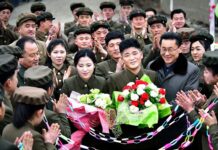[imText1]Shenyang, China — Bicycles are becoming ever more universal in North Korea, with seven out of 10 households owning them. As a result, the price of bicycles, compared to a year ago, has doubled.
According to defectors, bicycles, until the early 2000s, were considered the No. 1 item on the wish list of goods for a North Korean household. Mere three or four households out of 10 owned them.
However, a Pyongyang source said on the 21st, “If you went to a jangmadang recently, you’d see that people who sell or purchase goods mostly use bicycles. With the exception of those on the poverty line, most households have at least one bicycle.”
The source explained the reason for the large increase in bicycle ownership, “It is not so much that the people’s living situation has changed, but there has been a shift in mentality. Previously, people could only obtain bicycles after saving up enough money, but nowadays, people will borrow money, even at a high-interest rate, to acquire them. They think that they can claw back the cost of the bicycle through their business.”
With the ubiquity of jangmadang trading and the increase in business competition, bicycles have become must-have items.
A source from Shinuiju similarly stated, “In farmlands that are distant from the jangmadang, bicycles are an important means of linking to city markets. The merchants can triple or quadruple their profit, compared with those that don’t own bicycles.”
Some merchants with bicycles receive advance orders for industrial products from farmers and acquire them from city jangmadang. They then sell them to the farmers in exchange for vegetables, corn and grain, and generate profit by selling the fresh produce on. By analyzing the difference in prices between nearby jangmadang, the competition to earn every available 100 won has become fierce.
So, with the increasing importance of mobility for business, the concept of acquiring bicycles with high-interest loans has gained traction. Along with the bicycle boom, the bicycle price has rapidly increased as well.
The Shinuiju source said that Japanese-made used bicycles are being sold for 80,000 North Korean won (approximately USD22.2) each. With the increase in the number of people trying to buy bicycles and the cessation of direct trade with Japan, the price of imports has risen.
The source noted, “Over 80 percent of bicycles that are currently found in North Korea are Japanese-made used bicycles. North Korean people prefer goods that are made in Japan. The reason for the popularity of Japanese-made bicycles is that they are reliable but trendy. People can use them for a long time, so Japanese ones are more popular than North Korean or Chinese bikes and are sold at a higher price.”
Until last year, one could buy a Japanese-made used bicycle for just 40,000 North Korean won (approx. USD11.1).
The source added, “North Korean and Chinese bicycles now sell for 30,000~40,000 North Korean won. But Japanese bicycles, no matter the condition they are in, cannot be acquired for less than 80,000 won. If they are in a somewhat good condition, they can cost as much as 300,000 won. New products from the factory cannot be bought for less than 700,000 won (approx. USD194.4).”
The Japanese government, in response to the firing of missiles and nuclear experiments by North Korea, has prohibited imports from the country and prevented the entry of North Korean vessels into Japan since October 2006. It has also imposed sanctions and has limited the exchange of people.
The Japanese media reported that North Korea imported 6,434 bicycles from Japan in 2006 via the North Korean-registered cargo vessel Mankyungbong and after the prohibition on such trade 81,000 bicycles were imported via third-party nation cargo ships (as of the end of August 2007).
Now, North Korea uses borrowed cargo vessels registered in China or Cambodia… (to be continued).



















